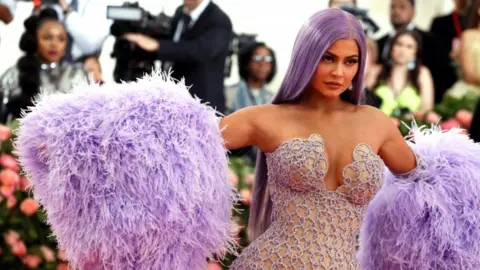'Influencers pay double': The ice cream truck defying Instagram freebies
 CVT Soft Serve
CVT Soft ServeLos Angeles-based ice cream van owner Joe Nicchi is giving social media influencers the cold shoulder.
Every week, bloggers, Instagrammers, and content curators with supposedly large social media followings make offers to promote his business on one condition: he gives them ice cream free of charge.
Since launching his company, CVT Soft Serve, in 2014, Mr Nicchi has rebuffed their requests. He told the BBC he has managed to cultivate a "good following of local customers" on social media without their help.
In recent months, however, he has become increasingly frustrated with influencers' proposals. Exasperated by what he deemed to be frivolous requests, Mr Nicchi instituted a new rule: "influencers pay double". He made a tongue-in-cheek sign for his rule which he displayed on his van "more for fun than anything".
"Last week we got a request to do a party for 300 people for free in exchange for 'exposure', which is the word they love to use," he told the BBC. "I said, 'this is crazy' and that's when I made the sign."
Allow Instagram content?

Announcing the influencer price hike (from $4 to $8) in an Instagram post, he told influencers he would "never give you a free ice cream in exchange for a post".
Ironically, his anti-influencer campaign has gained traction on social media. A post about his sign went viral on Reddit, fuelling the debate about the "freebie" culture around influencers.
"I've been getting a lot of supportive emails since this went viral," he said. "I think a lot of these influencers are hitting up small businesses for free products in exchange for posts with dubious value."
Mr Nicchi's defiant stand comes at a time of wider anti-influencer sentiment.
In March this year, a luxury beach resort in the southern Philippines won plaudits for rejecting promotional offers from "self-proclaimed influencers". In a viral Facebook post, the White Banana Beach Club Siargao suggested they get a job or try "another way to eat, drink, or sleep for free".
The resort's scathing response echoed that of Dublin's White Moose Café and Charleville Lodge, whose owner branded influencer marketing "cancerous". Hotel owner Paul Stenson refused British vlogger Elle Darby's request for a four-night stay in return for publicity on her social media pages.
The case of German influencers Catalin Onc and Elena Engelhardt appeared to inflict further reputational damage to the industry. The pair launched a GoFundMe campaign to finance a tandem bike trip to Africa. A ferocious social media backlash saw to it that the pair never reached their $10,000 (£7,900) target.
Allow Facebook content?

But despite these set-backs, social media influencers are still an attractive option for businesses looking to reach potential customers with their products and services.
Depending on the size of their following, influencers with a credible Instagram presence can earn anything between £100 to £750,000 for one post. A post by a reality TV star such as Kylie Jenner - who has more than 139 million followers on Instagram, 27 million on Twitter and 22 million on Facebook - would be at the top end of that scale.
The influencer marketing industry, according to TechJury, could be worth $10bn (£7.9bn) by 2020.
At least 10,000 followers are needed before influencers can "start making anything", said Kat Richardson of influencer marketing agency WaR.
Obsession with the number of followers is where brands are going wrong, Lauren Moody, head of digital at Gravity Thinking - a London-based creative marketing agency - told the BBC.
 Reuters
Reuters"Influencers are turning into a numbers game, which is what it shouldn't be," she said.
"Influencers have a strong following for a reason. They are specific about a niche area, passion point, or hobby. People look to them for advice and take note of the brands they recommend. That quality of engagement with that brand over quantity is what makes it a viable option for businesses."
She suggested brands and businesses have generated their own problems by offering freebies without considering the benefits of doing so.
"This is breeding the issues we're having where influencers are demanding things for nothing," she said. Therefore, she added, the "thought process" behind Mr Nicchi's surcharge for influencers was understandable.
Allow Instagram content?

Fashion blogger Anoushka Probyn, from London, said she understood Mr Nicchi's frustrations with "factions of the industry whose actions have earned influencers as a whole a reputation as blaggers".
"Working with brands and receiving freebies or being paid to promote products can be enticing for those looking to enter the industry, who may therefore reach out in such a way that is unprofessional and doesn't offer value to the brand," Ms Probyn, a freelance social media creator with 61,000 followers on Instagram, told the BBC.
She said "it's about so much more than the freebies" for her and others who have forged a career out of social media and content creation.
Critics such as Mr Nicchi, she said, ought to consider the importance of influencer marketing to small and large businesses that do see value in it. To dismiss influencers based on a few negative experiences "seems churlish" and demonstrates a lack of understanding of the industry, she said.
"It's part of a current wider image problem the industry is facing - yes, there will always be the blaggers, but there are also serious content creators offering a valuable advertising service through genuine endorsements," she added.
Allow Instagram content?

Based on Mr Nicchi's experiences of influencers, he is unlikely to be convinced of their merits. Although he recognises there are legitimate influencers out there, he says he is yet to meet one.
"I don't understand what they actually do," he said.
With A-list celebrities such as Mike Tyson, Adam Levine, Brad Pitt, Halle Berry and Bill Murray reported to among his customers, he may never need to.
